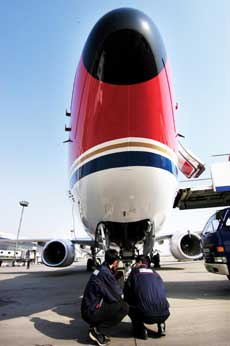|
Boeing says insulation blankets 'no problem'
By Ling Hu (China Daily)
Updated: 2005-04-08 06:39

Two technicians
check a B737-800 passenger jet in Taiyuan, Shanxi Province April 3, 2005
before a regular flight. Boeing's Beijing office said that Outdated
insulation blankets in some Boeing airplanes used in China pose no safety
problems. [newsphoto] | Outdated insulation blankets in some Boeing airplanes used in China pose no
safety problems, the company's China representative said yesterday.
Earlier this week, local newspapers reported that the US Federal Aviation
Agency (FAA) ordered operators of some Boeing aircraft models to replace or
modify certain insulation blankets over the next six years to reduce the risk of
fire spreading.
The insulation blankets in question are used in 27 Boeing aircraft in China.
"The problem was caused by new and tougher standards and there is actually no
safety problem," Liu Jiang, vice-president of Boeing China Inc, told China Daily
yesterday.
The primary purpose of aircraft insulation blankets is to protect the
passengers and crew from engine noise and frigid temperatures at high altitudes.
The FAA directive was prompted by a discovery in 2002 that some insulation
blankets, which are coated with a film called AN-26, no longer meet new
standards for preventing the spread of fire, said Liu.
He said Boeing has been notifying Chinese air carriers of the problem since
2002 and been offering technical support.
"The handling of the AN-26 issue has been ongoing," he said.
There are about 1,600 Boeing 727, 737, 747, 757 and 767 aircraft worldwide
that use this type of insulation all were made between 1981-88. Of those, 27 are
registered in China.
Insiders say China's "big three" airliners Air China, China Eastern Airlines
and China Southern Airlines all have aircraft that use this type of insulation.
"I think it's more about standards than quality," said a news officer with
Air China.
To replace the blankets, as the FAA has proposed, would cost approximately
US$330 million.
(China Daily 04/08/2005 page2)
|